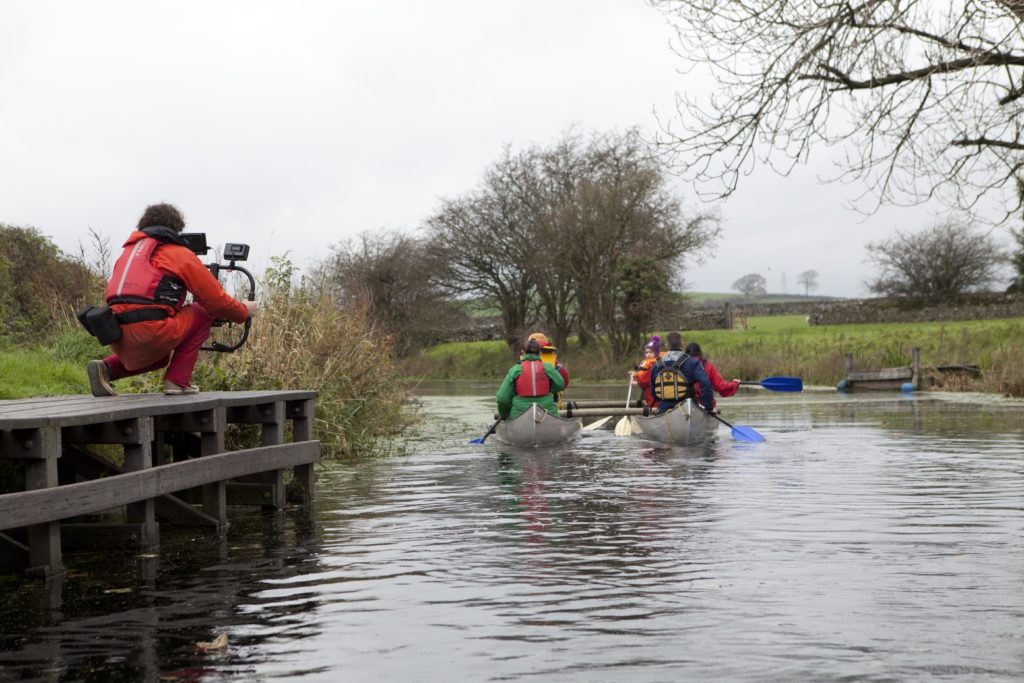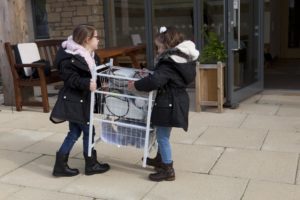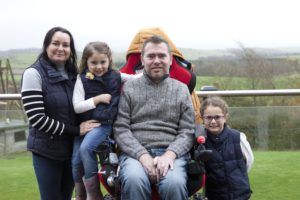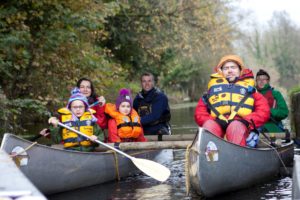Issue 4: Spring/Summer 2018
Grants to charities, Support for Freemasons and families

Jason Liversidge – father to Lilly and Poppy, and husband to Liz – has motor neurone disease, a progressive and life-limiting condition that affects his ability to move and talk. The family has been supported by both the MCF and the Province of Yorkshire, North and East Ridings since his diagnosis. The Bendrigg Trust is a residential activity centre in Cumbria that specialises in high quality outdoor learning courses for disabled and disadvantaged people. We gave the Trust a £40,000 grant in 2017.
Our marketing manager travelled to Cumbria to meet Jason and his family, and capture their adventures on camera.
The journey to Kendal takes six hours by train, so I decide to travel up the night before the family are due to arrive. The cold air hits me as soon as I step off the train… I hope I packed enough layers! I meet the film crew at the hotel and we grab a bite to eat while brainstorming ideas for tomorrow’s shoot. Then it’s off to bed to get a good night’s sleep!
The family aren’t due to arrive until lunchtime, but we’re up bright and early to make our way to the Bendrigg Trust. Eventually, we pull up outside a collection of buildings surrounded by miles of spectacular views of the Cumbrian countryside.
We have a couple of minutes to breathe in the fresh air before we head inside to meet Nick, Principal of the Bendrigg Trust, who’s the first to be interviewed. Nick is a natural and we get everything in one take! He tells us about all of the fully-inclusive activities available, from caving to canoeing to challenge activities. He tells us:
“It’s absolutely essential that we have funding from organisations like the MCF. Without it we wouldn’t be able to provide the services we do.”
I get a text from Liz to tell us they’re nearly here, so we rush down to Acorn House, the residential building where the family will be staying. A few minutes later, they park up and start unpacking.
 “As you can see, we don’t travel light!” Liz tells me as they pile up bags, boxes and equipment – everyone lends a hand, including six-year-old Lilly and four-year-old Poppy who shuffle along with a plastic chest of drawers. Jason is the last out of the van, helped by his carer, Thelma, in his all-terrain 4×4 electric wheelchair which he refers to as ‘The Terminator’.
“As you can see, we don’t travel light!” Liz tells me as they pile up bags, boxes and equipment – everyone lends a hand, including six-year-old Lilly and four-year-old Poppy who shuffle along with a plastic chest of drawers. Jason is the last out of the van, helped by his carer, Thelma, in his all-terrain 4×4 electric wheelchair which he refers to as ‘The Terminator’.
Our Outdoor Tutor, Jonny, gives us a tour of Acorn House and shows us the ceiling hoists funded by the MCF grant. The hoists mean that severely disabled people can move seamlessly around and between the bathroom and bedroom. The family seem impressed with the facilities.
“You don’t get many places as fully accessible as this that enable Jason to participate in things that able-bodied people can do,” Liz tells me.
Once everyone is settled in, we head off for the day’s activities! We spend a jam-packed afternoon zip wiring and tube sliding – when Jason reaches the bottom of the slide with Liz, I’m struck for the first time by the severity of his disability when it takes five of us to lift him from the ground to his wheelchair.

We then head out on a nature walk, which gives me a good opportunity to chat to Liz. She tells me about Jason’s diagnosis. He was fit and healthy up until a few years ago when he started experiencing weakness in his right thumb. It took a long time for doctors to diagnose motor neurone disease, and now he is almost totally paralysed.
Our life is very medicalised and the girls see all sorts of things that children shouldn’t have to see, so it’s nice for them to be able to go horse riding or have swimming lessons because it’s a bit of normality.
After our walk, there’s chicken pie and mash for dinner, then singing and toasted marshmallows around the campfire before bed.
The day starts with a cooked breakfast, then Thelma takes the girls for a walk while we interview Jason and Liz. Jason asks to be sat on the sofa next to his wife for the interview. As well as the hoists in the bathroom and bedroom, the MCF grant has also paid for hoists in the living room, so in a few minutes the couple are sat side by side.
The interview is emotional – I’m asking the questions and have to blink back tears at some points. Liz is a strong lady and I’ve watched her hold the family together in the short time we’ve spent together, but when she’s asked about Jason and the girls, her voice breaks.
“For us, one of the most important things is getting out and about and making memories with the girls while we still can. For Jason, it’s a major concern because the girls are very little, so we take lots of photos and videos so they can remember him.”
As soon as the interview is over, the girls – who have had their faces pressed against the living room door – run in to give their mum and dad a cuddle.
 We spend the rest of the morning canoeing down a local canal. I’m in one boat with the camera crew and the family is in another. We stop half way for hot chocolate and biscuits on the water – this has to be one of my best days at work ever!
We spend the rest of the morning canoeing down a local canal. I’m in one boat with the camera crew and the family is in another. We stop half way for hot chocolate and biscuits on the water – this has to be one of my best days at work ever!
After a slight mishap when the van keys get dropped in the water, we head back to the Trust for lunch before rock climbing. When we invited the Liversidge family to the Trust, I was determined from the start that they should have some time as a family, without cameras. We all go down to the fully-accessible indoor climbing wall and the crew and I stay long enough to watch Lilly and Poppy clamber to the top, then we say our goodbyes.
I’m back in the office today. As I make my morning cup of tea, I reflect on the last few days. It was fun, emotional, tiring, but more than anything I’m so glad to have met such a wonderful family who’ve made a few more memories together.
Now, with around 50 hours of footage… the editing begins!
If you have a financial, health, family or
care-related need get in touch with them today.
0800 035 60 90
help@mcf.org.uk